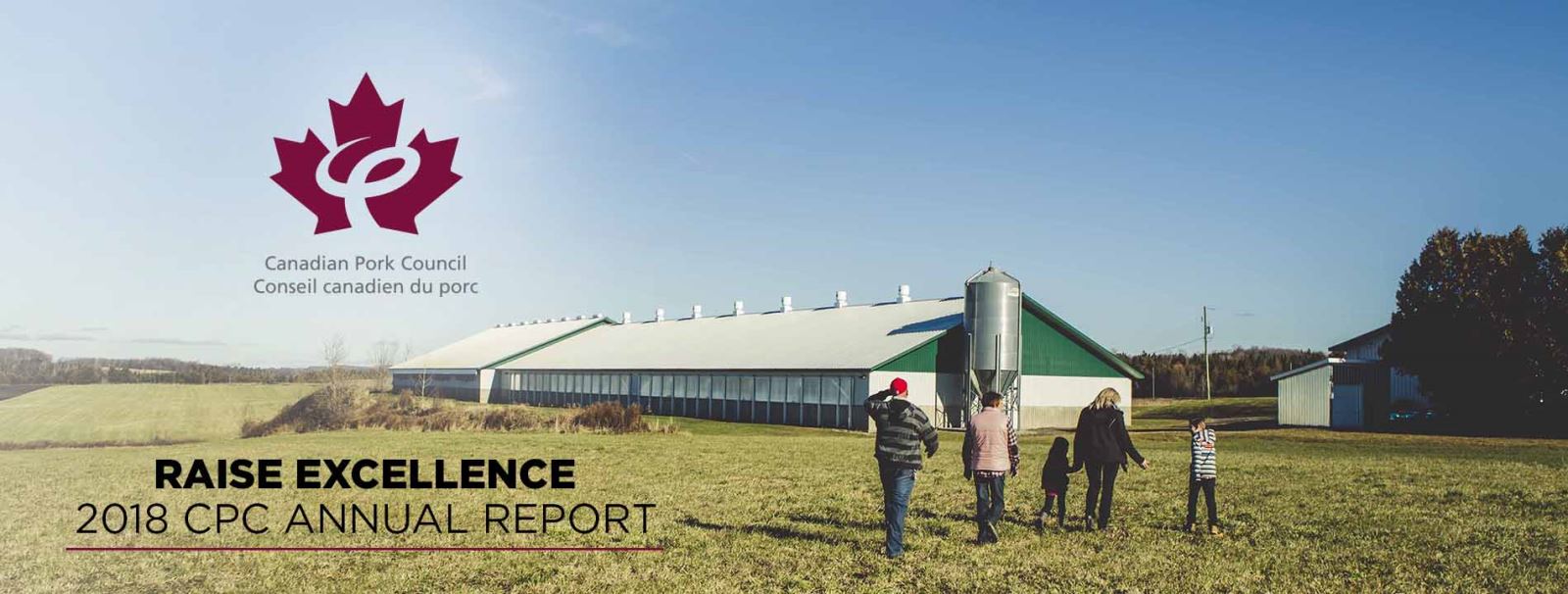CPC 2018 ANNUAL REPORT

2018 CHAIRMAN’S MESSAGE
Dear Friends of the Canadian Pork Council,
 It is with great honour that I preface this 2018 Annual Report with an overview of the strategic work done by the CPC over the past year to advance, promote and protect the excellence of Canadian pork production through effective advocacy, programs, and communication.
It is with great honour that I preface this 2018 Annual Report with an overview of the strategic work done by the CPC over the past year to advance, promote and protect the excellence of Canadian pork production through effective advocacy, programs, and communication.
In 2018 the Canadian Pork Council (CPC) renewed its strategic plan and focussed the efforts of the organization in four areas:
- Enhancing Value
- Managing Risks
- Strengthening Public Trust
- Ensuring Organizational Excellence
ENHANCING VALUE
Remaining profitable in the very competitive global market is not a simple matter. An unpredictable trade policy environment and the expansion of African swine fever in Europe and into China exacerbated the normal market volatility. Now, perhaps more than ever, the Canadian Pork Council is focussed on initiatives designed to improve producer returns working in close collaboration with its provincial members.
Within the Canadian Pork Excellence platform, considerable progress has been made in enhancing the Canadian Quality Assurance program and its Animal Care Assessment element. Each has been thoroughly updated and streamlined for easier use by producers.
However, it is not enough to simply launch programs and hope for positive returns. In working closely with Canada Pork International, the Verified Canadian Pork brand has been strengthened to capture the advantages of Canadian Pork Excellence.
The Canadian Pork Council ensured that federal legislators understood the importance of trade to Canada’s pork sector. CPC staff made sure that our message was heard whether directly or working closely with groups such as the Canadian Agri-Food Trade Alliance, Canadian Cattlemen’s Association or the Canadian Meat Council.
While progress was made in working to enhance pork demand, there remain a series of concerns. Foremost among them was the Government of Canada’s proposed “Healthy Eating Strategy”. The Council is working to ensure regulators and politicians have the correct information and understand the risks to specific groups, such as young women and seniors, of reduced meat consumption.
MANAGING RISKS
The CPC is doing its part to help producers manage risk. Among the most important initiatives are those related to improving animal health. The Council plays a leadership role in a wide range of animal health organizations including the: National Farmed Animal Health and Welfare Council; Canadian Swine Health Intelligence Network and the Senecavirus A Industry-Government Working Group.
Animal Health Canada is a significant undertaking that was launched in September 2018 that will help coordinate efforts to manage animal health issues.
The CPC’s PigTRACE program underpins the pig traceability system and is a critical tool to help manage disease outbreaks. The usefulness of the system was again demonstrated during the recent outbreak of porcine epidemic diarrhea in south-eastern Manitoba.
The Canadian Pork Council also does very important work “behind the scenes”. From simple things such as managing the flow of funds from producers to groups such as Swine Innovation Porc or sitting on boards of directors (e.g. Canadian Centre for Swine Improvement), these initiatives ensure that the risks facing producers are identified and actions are taken to address them.
Notwithstanding this progress, the Council continues to have significant concerns with the business risk management (BRM) suite of programs offered by the federal, provincial and territorial governments. The Council has been working with other groups, such as the AgGrowth Coalition, to amplify our message.
The establishment of a national checkoff agency and the resulting increase in the availability of funds for research and promotion would enable increased activity. However, despite two separate meetings with the Minister of Agriculture and Agri-Food and repeated discussions with the Minister’s staff and departmental officials, the file remains stalled. It is hoped that with the conclusion of the United States Mexico Canada Agreement that it may finally move forward.
STRENGTHENING PUBLIC TRUST
Canadians have great faith in the agri-food system that provides them with ready supplies of wholesome, affordable food. However, faced with seemingly endless negative information about their food—often from misinformed individuals—Canadians are demanding to know more about the food they eat.
Working through the Pork Value Chain Roundtable, which is co-chaired by CPC, measures are being taken to develop and articulate a sustainability plan.
ENSURING ORGANIZATIONAL EXCELLENCE
The Council is fortunate to have driven, passionate staff and a group of engaged producers on its Board of Directors. Working together, through various board-level committees or independently on ad hoc projects, these individuals make a difference. As a smaller organization CPC can only succeed when mindsets and priorities align across our country.
In working together with our provincial members and colleagues at the Government of Canada, we not only maximize the impact of our resources, we also develop solutions that are much stronger and more likely to be implemented.
This collaboration is not limited exclusively to the pork sector. Together with the Canadian Cattlemen’s Association and the Canadian Meat Council, the CPC has begun meeting regularly with Paul Glover, President of the Canadian Food Inspection Agency and his executive team. March 2018 marked the first time that the senior representatives from the major red meat sectors had met as a group with the CFIA management team.
In 2018 considerable attention was paid to the functioning of the Council itself. Good governance, sound financial management, openness and transparency are the cornerstones of an effective, efficient organization. Particular attention was paid to financial reporting including the implementation of a new Financial Reserve Policy.
Underlying all of our efforts is a very strong communication focus. Producers need to know what their organization is doing and stakeholders need to know what we think. In 2018 a new social media approach was implemented. It is anchored by a newly designed website and provided the tools to reach out to a wider range of stakeholders. A series of customized products, including board meeting summaries and an activity report ensure the CPC’s members know about their Council and its activities.
LOOKING FORWARD
With the new year upon us comes a new series of challenges.
The very key priorities for 2019 include the:
- on-farm deployment of the PigSAFE | PigCARE programs;
- development of a “Made-in-Canada” hog price;
- creation of a promotion and research agency;
- completion of the 5-year review of the Code of Practice for the Care and Handling of Pigs;
- an enhanced advocacy program; and
- determining the value of the Canadian Pork Excellence platform and its fair distribution.
Your Council is well positioned to meet these challenges.
Rick Bergmann
January 7, 2019